We may not have the course you’re looking for. If you enquire or give us a call on 01344203999 and speak to our training experts, we may still be able to help with your training requirements.
We ensure quality, budget-alignment, and timely delivery by our expert instructors.
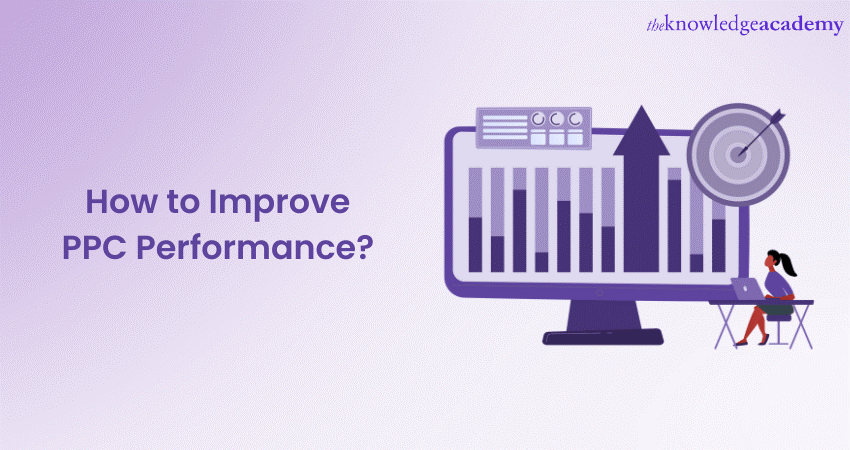
Steering through the online marketing landscape is a persistent challenge. To win, it requires precision, agility, and the right tools. After all, a great Marketing Campaign goes beyond just the clicks; it's about making every penny work for you. To stay ahead of the pack, a great pay-per-click (PPC) strategy is a must. This blog explores the proven steps on How to Improve PPC Performance. From ad copy optimisation and ad extensions to remarketing and A/B testing, there are plenty of ways to leave your competition in the dust. So read on and turbocharge your PPC campaigns with ease!
Table of Contents
1) What is PPC? Brief Explanation
2) 13 Tips to Improve PPC Performance
3) What Metrics Should I Track to Measure PPC Performance?
4) How Often Should I Review and Update My PPC Campaigns?
5) Conclusion
What is PPC? A Brief Explanation
Pay-per-click (PPC) advertising is an efficient and cost-effective way to reach your target audience online. You incur a minor charge when a person clicks on your advertisement. This positions PPC as an excellent way to showcase your website to individuals who are already curious about your services.
In a PPC campaign, you bid on keywords related to your promoted products or services. When a user looks for a keyword you've bid on, your advertisement could appear on the Search Engine results page or various websites affiliated with the Search Engine.
The Search Engine employs an auction to establish which ads are shown and their sequence. The advertiser placing the highest bid isn't necessarily the one whose ad appears first. The Search Engine also estimates the quality of the advertisement and the linked website. The successful ad is featured prominently in the search results, frequently above the natural listings.
Popular platforms for PPC advertising include:
1) Google Ads
2) Microsoft Advertising
3) LinkedIn Ads
4) Facebook Ads
13 Tips to Improve PPC Performance
PPC provides you with granular control over your advertising and its costs. When you have so much control over your advertising campaigns, you have more opportunities to improve your campaign. Here are the top 13 tips on How to Improve PPC Performance.
1) Refine Your Keyword Strategy
Use tools like SEMrush, Google Keyword Planner, or Moz to identify high-volume, low-competition keywords that can drive traffic to your site. Focus on prioritizing keywords that closely align with your audience's search intent to ensure relevance and maximize engagement.
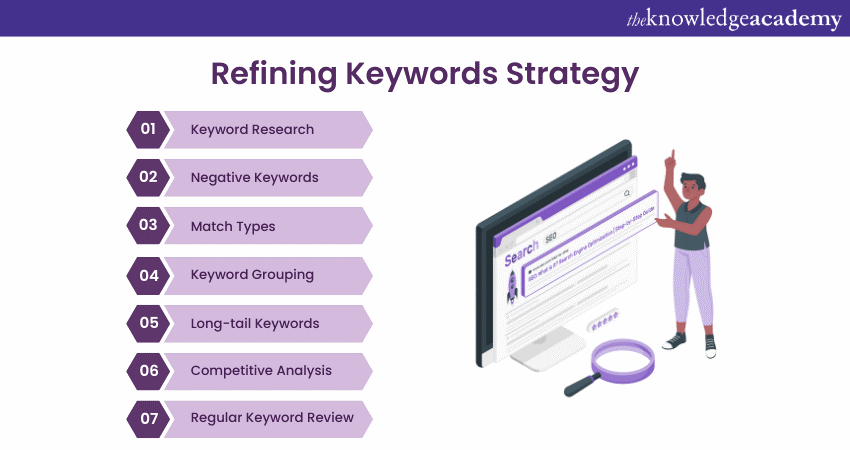
2) Negative Keywords
Identify and exclude irrelevant search terms by utilizing negative keywords to avoid wasting your budget. Regularly analyze search term reports to continuously refine and update your negative keyword list.
3) Match Types
Experiment with broad, phrase, and exact match types to control the reach and relevance of your ads. Continuously monitor performance and adjust match types to optimize your campaign results effectively.
4) Keyword Grouping
a) Organise keywords into tightly themed ad groups based on their relevance or product categories.
b) Ensure each ad group has tailored ad copies to improve relevance and Quality Scores.
5) Long-tail Keywords
a) Target specific, less competitive keywords with lower search volumes but higher conversion potential.
b) Focus on attracting users further along in the buying process.
6) Competitive Analysis
a) Study competitors’ keyword strategies to discover gaps and identify opportunities.
b) Use tools like SpyFu or Ahrefs to uncover competitor keyword performance.
7) Regular Keyword Review
a) Analyse performance data to pinpoint high-performing and underperforming keywords.
b) Adjust bids and strategy based on keyword performance metrics.
2) Optimise Ad Copies
d) Encourage Action
Use urgency-inducing phrases like "limited-time offer" or "exclusive discount" to prompt immediate clicks.
e) Experimentation
Test different ad copy variations, including headlines, calls-to-action, and offers.
Analyse results to identify the most effective messaging and refine your strategy.

Learn how to write better and craft high conversion ad copies with our up-to-date Content Marketing Course.
3) Improve Quality Score
Quality Score measures the relevance and usefulness of your keywords, ad copy, and landing pages. A higher score improves the likelihood of your ads being seen and clicked. You can enhance your Quality Score by:
a) Aligning with User Intent: Ensure ad copy, keywords, and landing pages are aligned with user search intent.
b) Tightly Themed Ad Groups: Group relevant keywords into well-organised ad groups.
c) Matching Content: Align ad copy with landing page content to signal relevance to search engines.
d) Fast-loading Pages: Deliver pages that load quickly and are mobile-responsive.
e) User Satisfaction: Provide content that directly fulfills the promise of the ad, ensuring a positive user experience.
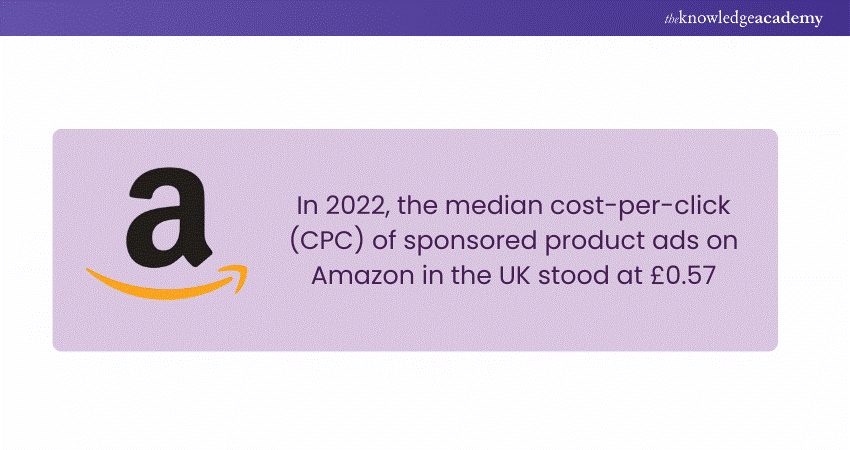
4) Optimise Campaigns for Mobile
To effectively engage your audience on mobile devices, follow these strategies:
a) Responsive Landing Pages: Ensure landing pages and websites adapt seamlessly to various screen sizes.
b) Mobile-specific Ad Copy: Craft concise, compelling ads tailored for mobile users, using mobile-friendly formats.
c) Mobile Targeting Options: Use platform-specific options to segment and target campaigns by:
d) Device type
e) Operating system
f) Mobile app usage
g) Click-to-Call and Click-to-Message: Enable features that allow mobile users to contact your business directly with ease.
h) Performance Monitoring: Regularly track and analyse the performance of your mobile campaigns to refine your approach.
5) Optimise Landing Pages
Consider the following:
a) Dedicated Landing Pages: Create pages that directly align with the intent of your ads.
b) Fast Loading Times: Ensure quick load speeds for better user experience.
c) Clear Messaging and CTA: Use concise messaging and a prominent call-to-action (CTA) to guide users effectively.
d) Relevant Keywords: Integrate relevant keywords into landing page content for better ad-to-page relevance.
e) A/B Testing: Conduct A/B tests to refine your landing page design and content for maximum impact.
6) Leverage Ad Extensions
Ad extensions enhance PPC ads by providing additional information and increasing visibility. Key types include:
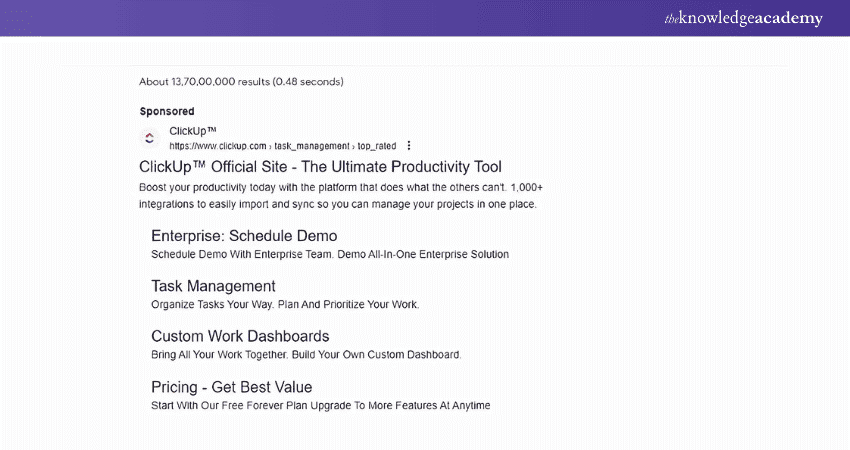
Call extensions encourage users to directly call your business, especially on mobile devices, facilitating immediate connections and conversions. Review extensions display positive customer feedback and testimonials, building trust and credibility.
a) Sitelink Extensions: Highlight specific website pages to direct users to relevant content.
b) Call Extensions: Encourage direct calls, especially on mobile devices, to facilitate immediate conversions.
c) Review Extensions: Showcase positive customer feedback to build trust and credibility.
Benefits:
a) Increase ad space on search results.
b) Stand out from competitors.
c) Boost click-through rates and drive higher-quality traffic.
7) Implement Conversion Tracking
Setting up conversion tracking is a great way to measure the success of your campaigns. Track and analyse key metrics including click-through rates (CTRs), conversions, and cost per conversion.Use this data to:
a) Optimise your campaigns.
b) Allocate budget to high-performing keywords and ads.
Conversion tracking helps measure campaign success and optimise performance:
Metrics to Track:
a) Click-through rates (CTR)
b) Conversions
c) Cost per conversion
Uses:
a) Optimise campaigns based on performance.
b) Allocate budget to high-performing keywords and ads.
c) Make data-driven decisions to maximise ROI.
8) Leverage Audience Targeting
Leveraging audience targeting allows you to reach the right people with your PPC ads, increasing the relevance and effectiveness of your campaigns. Here are a few key points to consider:
a) Demographic Segmentation: Divide your audience based on demographics such as gender, age, income, and location to deliver tailored ads to specific groups.
b) Interest-based Targeting: Target users based on their interests, hobbies, and behaviours to reach the users who are more likely to be interested in your products or services.
c) Remarketing: Re-engage with previous website visitors by showing targeted ads, increasing brand recall and enticing them to return and convert.
d) Lookalike Audiences: Create audiences that resemble your existing customers, allowing you to reach new prospects with similar characteristics and interests.
By leveraging audience targeting, you can:
a) Optimise your ad delivery.
b) Improve relevance.
c) Increase the likelihood of reaching and converting the right audience.
Learn how to position your brand, research the market and audience and gain the upper hand with our comprehensive Marketing Research Training – Register now!
9) Implement Remarketing Campaigns
Remarketing campaigns are powerful tools for re-engaging with users who have previously shown interest in your brand. Here are a few key points to carry out remarketing effectively:
a) Segment your remarketing audiences based on specific actions or behaviours, such as website visitors, cart abandoners, or past purchasers. This enables you to tailor your ad messaging and offers to each segment.
b) Craft personalised ad copy that speaks directly to your remarketing audience's interests or needs. Highlight special offers, discounts, or incentives to entice them to revisit your website and complete their desired actions.
c) Set up frequency caps to avoid bombarding your audience with repetitive ads. Strike a balance between staying visible and maintaining a positive user experience.
d) Utilise dynamic remarketing to show personalised ads featuring products or services users have previously viewed on your website. This helps reinforce their interest and encourages them to return to make a purchase.
e) Extend your remarketing efforts beyond the search network to reach users on various platforms such as Social Media, display networks, or email. This reinforces your brand presence and keeps you top of your mind.
By implementing remarketing campaigns, you can re-engage with interested users, increase brand recall, and drive conversions by delivering targeted and personalised messaging that aligns with their previous interactions with your brand.
Leverage the power of email for your remarketing efforts with Email Marketing Training – Sign up now!.
10) Conduct Competitor Analysis
Stay updated on your competitors' PPC strategies and performance. Analyse their ad copy, keywords, and landing pages to identify gaps in their strategy and leverage potential opportunities. Be aware of the industry trends and stay ahead of the competition through continuous refinement and optimisation of your campaigns.
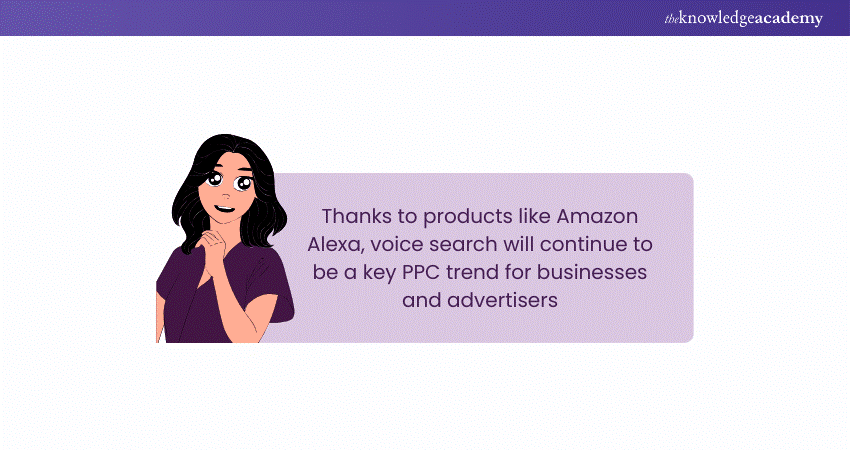
11) Regularly Monitor and Optimise Your PPC Campaigns
PPC campaigns require ongoing monitoring and optimisation. Consider the following:
a) Regularly review your campaign performance.
b) Identify underperforming keywords or ads.
c) Make data-driven adjustments.
d) Test different ad formats, bidding strategies, and targeting options to pinpoint the optimal combination for your goals.
e) Stay updated with platform updates and industry best practices to stay ahead in the dynamic PPC landscape.
12) Have a Well-defined Goal for Your Campaigns
Having a well-defined goal is fundamental to improving your PPC performance. Consider the following points:
a) Clearly define your goal, be it increased traffic, lead generation, or product sales.
b) A precise goal guides keyword selection, ad copy creation, and landing page optimisation.
c) It ensures the tracking of relevant metrics for measuring success.
d) Such a goal allows for efficient budget and resource allocation and focuses efforts on areas that drive the most impact.
e) It helps set Specific, Measurable, Achievable, Relevant, and Time-bound objectives.
f) A well-defined goal helps you avoid running directionless campaigns that hamper performance.
13) Implement A/B Testing
A/B testing compares two webpage versions, ad copies, apps, or creatives to determine which performs better. In PPC, A/B testing enables marketers to evaluate various ad elements such as images, headlines, calls to action (CTAs), or landing pages. This involves:
a) Picking an element in your ad that could influence the success of your campaign.
b) Formulating two distinct versions of the ad element you are evaluating.
c) Setting up the A/B test using tools or platforms to present both variations to your target audience.
d) Monitoring and analysing the results where you observe how both variations perform over time.
What Metrics Should I Track to Measure PPC Performance?
Key metrics include Click-Through Rate (CTR), Conversion Rate, Quality Score, Cost Per Acquisition (CPA), and Return on Ad Spend (ROAS). Regularly analysing these metrics will smoothen the process of identifying areas for improvement.
How Often Should I Review and Update My PPC Campaigns?
You should review and update your PPC campaigns regularly to ensure optimal performance and alignment with your goals. Daily checks involve monitoring key metrics like impressions, clicks, CTR, and budget usage while addressing any immediate issues. Weekly, analyse keyword performance, adjust bids, test ad copy, and refine targeting. Monthly, assess overall campaign performance, refresh ad extensions, and review landing pages for relevance and optimisation. Quarterly, conduct comprehensive audits, experiment with new strategies, and analyse competitor activity. Additionally, update campaigns as needed to reflect business changes, seasonal trends, or market shifts. Regular updates help maximise ROI, improve ad relevance, and stay competitive.
Conclusion
In conclusion, achieving optimal performance in PPC Marketing requires strategic planning and constant refinement. Whether you are looking to improve conversion rates, reduce costs, or boost overall campaign effectiveness, understanding How to Improve PPC Performance can help you catalyse your business success. The steps outlined in this blog will guarantee maximum ROI and measurable results for your organisation ambitions.
Master the latest marketing skills and techniques with our extensive Digital Marketing Training – Sign up now!
Frequently Asked Questions
How can I Improve My PPC Quality Score?

You can improve PPC quality score by:
a) Analysing impression share data where impression share represents the percentage of times your ads were displayed out of the total available impressions for which the ads were eligible.
b) Loosening up restrictive match types and add broad match keywords.
c) Use gathered data to create a forecasting model using spreadsheets or specialised PPC forecasting tools.
What are the Other Resources and Offers Provided by The Knowledge Academy?

The Knowledge Academy takes global learning to new heights, offering over 30,000 online courses across 490+ locations in 220 countries. This expansive reach ensures accessibility and convenience for learners worldwide.
Alongside our diverse Online Course Catalogue, encompassing 19 major categories, we go the extra mile by providing a plethora of free educational Online Resources like News updates, Blogs, videos, webinars, and interview questions. Tailoring learning experiences further, professionals can maximise value with customisable Course Bundles of TKA.
What is The Knowledge Pass, and How Does it Work?

The Knowledge Academy’s Knowledge Pass, a prepaid voucher, adds another layer of flexibility, allowing course bookings over a 12-month period. Join us on a journey where education knows no bounds.
What are the Related Courses and Blogs Provided by The Knowledge Academy?

The Knowledge Academy offers various Marketing Courses, including the Pay Per Click (PPC) Training and the Mobile Marketing Course. These courses cater to different skill levels, providing comprehensive insights into the Top 50 PPC Interview Questions and Answers.
Our Digital Marketing Blogs cover a range of topics related to PPC Marketing, offering valuable resources, best practices, and industry insights. Whether you are a beginner or looking to advance your PPC Marketing skills, The Knowledge Academy's diverse courses and informative blogs have got you covered.
Upcoming Digital Marketing Resources Batches & Dates
Date
 Pay Per Click (PPC) Training
Pay Per Click (PPC) Training
Fri 14th Feb 2025
Fri 11th Apr 2025
Fri 13th Jun 2025
Fri 15th Aug 2025
Fri 10th Oct 2025
Fri 12th Dec 2025






 Top Rated Course
Top Rated Course



 If you wish to make any changes to your course, please
If you wish to make any changes to your course, please


